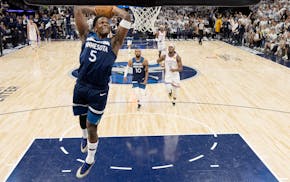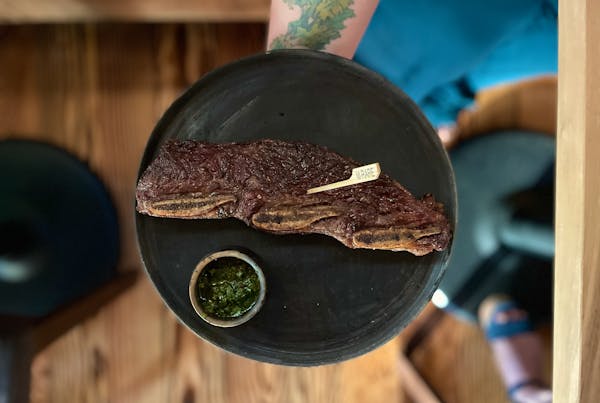DENVER – The Timberwolves swept the Phoenix Suns, while surviving Kevin Durant, Devin Booker and Bradley Beal.
Then the Wolves dethroned the Denver Nuggets, featuring three-time MVP Nikola Jokic and shotmaking sidekick Jamal Murray.
The NBA is a solar system. The Wolves are proving that systems can foil stars.
Next up is another Western Conference team led by superstars. Wednesday night at Target Center, the Wolves will play Game 1 of the Western Conference finals against Dallas' Luka Doncic and Kyrie Irving.
The former is as good an offensive player as there is in the league. The latter is one of the most spectacular playmaking guards the league has ever seen, and he's even playing intense defense for the first time in years.
Doncic and Irving provide a unique yet familiar challenge: Can the Wolves' strong eight-man rotation and talented front line defend and wear down a team relying on star power?
What the Wolves have proved this postseason is that they, unlike many other Western Conference teams, can win even when they don't get efficient scoring from one of their stars.
The Wolves lost Game 4 against Denver despite Edwards' 44 points, a career-high for him in a playoff game. They won Game 7 despite Edwards missing 18 of his 24 shots and scoring just 16 points.
It's natural to assume that NBA teams will go as their star goes, but depth, defense and coaching have been as important to the Wolves as Edwards' jump shot.
In Game 7 of the Western Conference semifinals on Sunday night in Denver, the Wolves overcame a 20-point deficit to win 98-90, even though Edwards, Mike Conley, Nickeil Alexander-Walker and Kyle Anderson shot a combined 9-for-41 from the field.
The Timberwolves are 8-1 this season when Edwards is held to five or fewer points in the first half.
Wolves President of Basketball Operations Tim Connelly has built a deep roster that can win in different ways on different nights.
Connelly built the Nuggets team that won the title in 2023.
In 2024, two years after Connelly left, the Nuggets lacked depth and the Wolves proved to have the stronger roster. That may not be a coincidence.
Edwards finished seventh in the MVP voting. Rudy Gobert won Defensive Player of the Year. Naz Reid won Sixth Man of the Year. Chris Finch finished third in Coach of the Year voting.
Virtually every decision Connelly has made with the Wolves has produced the desired result. The same could be said for every decision he didn't make.
He signed Edwards, Jaden McDaniels, Reid, Karl-Anthony Towns, Alexander-Walker and Conley to contract extensions. Gobert is signed through next season, with a player option for 2025-2026.
The only member of the Wolves' regular eight-man rotation who is not signed long-term is Anderson.
This team was built to win this year, but also to contend for years to come.
Just as notably, Connelly didn't replace Finch, even though many sports executives want to make their mark by hiring their own coach.
He didn't trade Towns, even though such a move would have been popular with the Timberwolves fan base a year ago.
Continuity is vital in the NBA, especially on defense, where connectedness and trust are required. Connelly was patient when the Gobert deal failed to produce immediate results, and now he and the Wolves are reaping the rewards.
The Wolves are favored to defeat Dallas in part because they could defeat Dallas in a half-dozen ways — with size, defense, three-point shooting, transition offense … or Edwards taking over the game offensively.
They might win because the Mavericks disregard McDaniels and he makes them pay with corner three-pointers or drives to the basket.
They might win because Towns provides a reminder that he is one of the best shooting big men in the history of the three-point shot.
They might win because their intense defense frustrates Doncic, the league's whiniest superstar.
They might win because Finch throws unexpected looks at the Mavericks that give his team an advantage.
This team is a product of intuitive design and player unselfishness.
This team should advance to the NBA Finals.
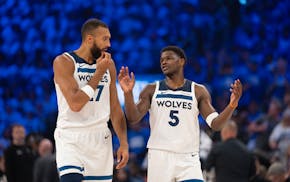
Souhan: If Edwards is a franchise player, he needs to act and play like it
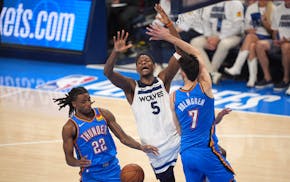
Souhan: Wolves' weak performance in Game 5 invites change, so don't let it shock you
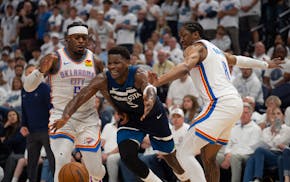
Souhan: Edwards and Randle flop in the Timberwolves' biggest game of the season
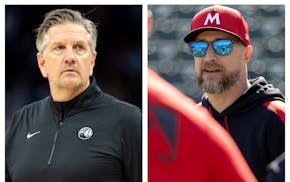
Souhan: Twins' Baldelli and Timberwolves' Finch have a lot in common. They ought to talk.
